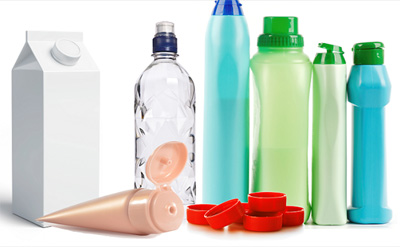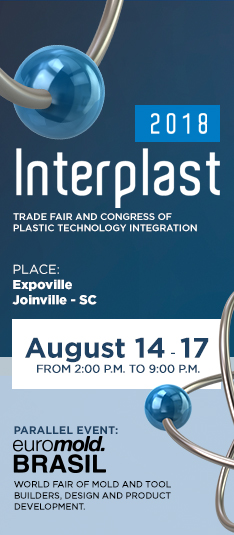
May, 07, 2018 - SABIC showcased at NPE 2018 its focus on growing in key markets, drawing upon its market knowledge, expertise in application development, and its expanding portfolio of polyolefin, engineering thermoplastic, and specialty materials.
These markets include pipe and utilities, thin-wall packaging, caps and closures and personal hygiene. The company’s booth featured applications in each of these areas.
“For each of these market spaces, we have formed business teams to focus on developing and driving tailored technology platforms and new products for customers in these segments,” said Abdulrahman Al-Fageeh, SABIC’s executive vice president for the Petrochemicals business unit. “We have asked these teams to base all innovation, service and application development support on the existing and emerging needs of customers.”
SABIC already offers an array of material technologies for these markets, including foam and polymer products, a range of polyethylene and polypropylene plastics, high-performance thermoplastics and more.
Now, the company is moving to broaden access to these technologies for customers based or operating in the Americas, to serve the above-noted segments, as well as traditional markets for the company in the region such as automotive, building and construction, healthcare and others.
“What visitors were seeing at our NPE booth is the product of our transformational work over the past few years,” said Al-Fageeh. “We restructured our businesses in ways that have sharpened our market focus and level of customer dedication. Our attention is set on identifying and satisfying the unmet needs of our customers, producing innovative and lasting solutions. We believe this market-focused approach best allows us to help drive performance for those who choose to place their business with us and serve as their dependable long-term supplier.”
Committed to Growth in the Americas
Al-Fageeh added that SABIC has set ambitious goals for growth in the Americas, especially in the United States. In fact, he highlighted SABIC’s aim to double its manufacturing footprint in the country within the next five years, growing its sales here from almost three million tons annually now to about six million tons by 2022.
“SABIC has targeted the United States and the larger Americas region as a strategic geography for growth, which will be driven by our proven chemistries, application development capabilities, and commitment to help our customers succeed,” said Greg Adams, vice president for SABIC in the Americas. “Ultimately, customers will benefit as we add a wider array of advanced material options for them to tap into and greater opportunities to collaborate with us on the next set of breakthroughs in their respective industries.”
One such breakthrough enables the creation of specialty polyethylene products to meet the increased demand for flexible packaging. The breakthrough is SABIC's own proprietary metallocene catalyst C6 LLDPE technology. Metallocene catalyst is an advanced technology for producing highly differentiated and value-added PE products for various applications that required exceptional properties.
Sustainability – Scaling Up Quality Recycling
As SABIC strives for further growth in the Americas and elsewhere globally, the company is also demonstrating its focus on sustainability. The company recognizes the opportunity to chemically recycle plastic waste that is today being incinerated or used for landfill. SABIC has made a strong commitment to scale up high-quality recycling processes for chemical recycling of mixed plastic waste to the original polymer, using its know-how, resources, and resolve to help reduce the waste stream.
Highlights of the SABIC NPE 2018 Booth
In addition to showcasing solutions for new segments, SABIC was highlighting at NPE 2018 a range of innovative materials from both its petrochemicals and specialties plastics portfolios for use in traditional markets such as automotive, building and construction, consumer goods and electronics, healthcare, mass transportation, as well as new and emerging technologies in additive manufacturing and composites.
Automotive:
- Lightweight body in white reinforcement components. SABIC claims that its plastic-metal hybrid technology featuring NORYL GTX™ resin may reduce weight by up to 30% vs. high-strength steel – without compromising structural crashworthiness of the vehicle.
- Steering wheel column. This application demonstrates SABIC’s new portfolio of SABIC® polypropylene (PP) compounds that, according to SABIC, deliver a soft feel and improved haptics for applications such as unpainted, low gloss automotive interior components.
- Aerodynamic roof fairing. Using Augmented Reality (AR) technology, SABIC is demonstrating how a thermoplastic-based roof fairing on heavy trucks can help overcome drag by up to five percent, potentially generating fuel savings of 2 to 4 percent for truck and fleet operators, the company claims. The AR experience allowed booth visitors to see how the part’s built-in air ducts reduce front end pressure and accelerate airflow both over the surface and through the part itself.
Building & Construction:
- Pipe Skyline. SABIC’s portfolio of pipe materials were featured by market segment – infrastructure, domestic, industrial, agriculture and aquaculture – in an pipe display that showcases material details and target applications.
- Water filtration module. According to SABIC, NORYL™ resin’s hydrolytic and dimensional stability and chemical and high temperature resistance enabled Cerafiltec to avoid corrosion-prone steel framing with a fully injection-molded module design.
Packaging:
- Sustainable food/non-food containers. SABIC says that is PP FLOWPACT™ impact copolymers feature high flow and high stiffness to enable thin-wall designs and fast injection that help reduce material and energy use.
- Caps and closures for packaging. Various caps, closures and product delivery mechanisms for beverages, food and non-food applications were on display, highlighting use of SABIC’s PP, HDPE, LDPE, LLDPE and ETP materials for these applications. Among the many potential benefits from use of these solutions are good environmental stress cracking resistance to enhance weight optimization and lower temperature processing for significant reduction in cycle times and energy consumption, SABIC claims.
- NEXLENE™ technology. A range of tough packaging products made using SABIC’s recently introduced NEXLENE™ technology were on display at the booth. These include SABIC® SUPEER™ stretch film grades, which are particularly suited for stiff, thin stretch film applications; SABIC® COHERE™ 8102 and SABIC SUPEER 8112 stretch hood pallet wrap; and PVC-free cling film made from SABIC’s metallocene PET; among others. These products illustrate SABIC’s commitment to the packaging space.
Healthcare:
- eNeura® migraine relief device. eNeura chose custom-colored LEXAN™ PC copolymer, a healthcare grade, for the sleek housing of its new sTMS mini® device. The material delivers biocompatibility, impact and chemical resistance and light weight, according to SABIC.
- Sterilization tray and arm cast. Additively manufactured parts using new SABIC healthcare filaments for fused deposition modeling benefit from biocompatibility, sterilizability and mechanical performance.
Personal Hygiene:
- Absorbent products. SABIC says that its phthalate-free PP materials for non-woven applications offer excellent absorption, softness and light weight.
Consumer Goods & Electronics:
- Thin-wall structural component. According to SABIC, demanding structural components in electronics can benefit from the new THERMOCOMP™ HMD-D family of high modulus ductile compounds. These reinforced polycarbonate grades can replace metal for lighter weight and thinner geometries.
- Molded cell phone cases. Laser direct structuring using THERMOCOMP™ LDS compounds allows customers to make 3D parts and activate the 3D surface for proper metallization.
- Metal-plastic hybrid cell phone back cover. Nano-molding technology (NMT) involves injecting plastic resin onto a metal surface. Using SABIC THERMOTUF™ compounds for NMT, electronics OEMs can replace insert molding/die casting to help achieve miniaturization and expand design freedom, the material manufacturers claims.
Emerging Technologies:
- UDMAX™ tapes. SABIC says that the newest UDMAX tape grade delivers exceptional tensile strength for reinforcing such industrial applications as pipes and pressure vessels. According to the company, itt offers a high loading of glass fiber, impregnated using SABIC’s proprietary HPFIT™ technology.
- Livrea Yacht hull section. Produced using large format additive manufacturing, the two-layer hull features light weight and strength from carbon-reinforced materials, including ULTEM™ PEI compound.
Source: SABIC


